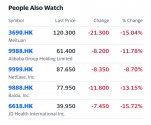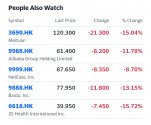Nor Liz Truss Geographic expertise and Cursula Von der Lying " In Tatters" moment.Xi may not have the intellectual pedigree of his predecessors but I doubt that he is afflicted with actual mental disabilities or require the wearing of an adult diaper at all times. So what if he only has middle school level education. Middle schoolers can still calculate compound interests, something that Mrs Haley apparently had trouble with.
You are using an out of date browser. It may not display this or other websites correctly.
You should upgrade or use an alternative browser.
You should upgrade or use an alternative browser.
Chinese Internal Politics
- Thread starter FairAndUnbiased
- Start date
right now likely mapping is as follows, based on who is elected to what committee:What is the mapping between CPC posts and government positions? Do the standing committee and overall politburo appointments automatically mean so-and-so will be in what government positions?
li qiang- premier
zhao - NPC
wang - political consultative
cai - first secretary
ding - vice premier
li xi - disciplinary
Qualified candidates only. MBA and Finance guys ie George Soros types need not apply.
Thankfully no Gender Studies or Critical Race Theory graduates here too...
However I haven't see a clear successor in this PBSC for 2027 yet. Xi will be 74 by 2027 and definitely need to retire by then or he would be 79 at the end of next tenure.
Ok Ding Xuexiang might be an option to succeed Xi in 2027 but Ding will also be 65 by then. Also he is pretty much a technocrat, never served as a region governor. IMO he won't be the successor, but I might be wrong since Xi broke many norms.
In comparison, Deng took the role of leadership at the age of 74 but he never served as General Secretary himself. Hu Yaobang came GS at the age of 67, Zhao Ziyang at 68 and both of them created deep instability and then Tian'anmen happened.
Jiang Zemin took over the seat at 63, Hu at 60. Xi became General Secretary at the age of 59, youngest leader since Mao. I don't understand why Xi hasn't appointed a successor yet given his age.
Well, there is no obvious successor, and I think that's clearly by design. Xi is centralizing power and there's certainly positive efficiencies to that.
As for continuation/succession concerns, I assume you'd try to mitigate through a combination of the deep bench of experience and authority in the form of the Party Elders, and upcoming new dynamic talent.
Like the above Twitter thread shows, along with China's growth, younger officials have increasingly broad and advanced experiences and opportunities.
Li Qiang worked his way up through China's economic heartland in the Yangtze River Delta. He's interfaced with Alibaba up through Tesla.
Ma Xingrui held various prestigious and successful posts in academia, space, and defense. He has governing experience in Shenzhen, Guangdong, and now Xinjiang.
Zhang Guoqing worked his way up the corporate ranks at Norinco before holding office in Chongqing, Tianjin, and Liaoning.
I'd say their resumes all compare favorably with previous leaders.
Its because of the GDP data I think. Although it beat gdp estimates, it missed the March's CCP target of 5.5%View attachment 100071
This is today, after dropping more than -70%, so it looks like the 'bump' will be -80% (?!)
I have absolutely no idea what this all means, I'm completely lost.
...
Isn't this the first market movement since Xi was elected to third term? After last weekend's Party Congress, Western investors worry Xi is 'cementing an iron grip on power' and 'returning to Maoism', hence pulling capital out of the Hong Kong stock exchanges.Its because of the GDP data I think. Although it beat gdp estimates, it missed the March's CCP target of 5.5%
Typical.
George Soros and his buddies trying to do a 'Bank of England' on China.
Last edited:
They'll be back once data on company performance and tech development starts flowing outIsn't this the first market movement since Xi was elected to third term? After last weekend's Party Congress, Western investors worry Xi is 'cementing an iron grip on power' and 'returning to Maoism', hence pulling capital out of the Hong Kong stock exchanges.
Typical.
Previous administration was also more than willing to drop the hammer on big tech (for example: ant ipo and online tutoring)
This time the administration is even more stacked with xi’s guys so I guess investors are anticipating similar policies
This time the administration is even more stacked with xi’s guys so I guess investors are anticipating similar policies


